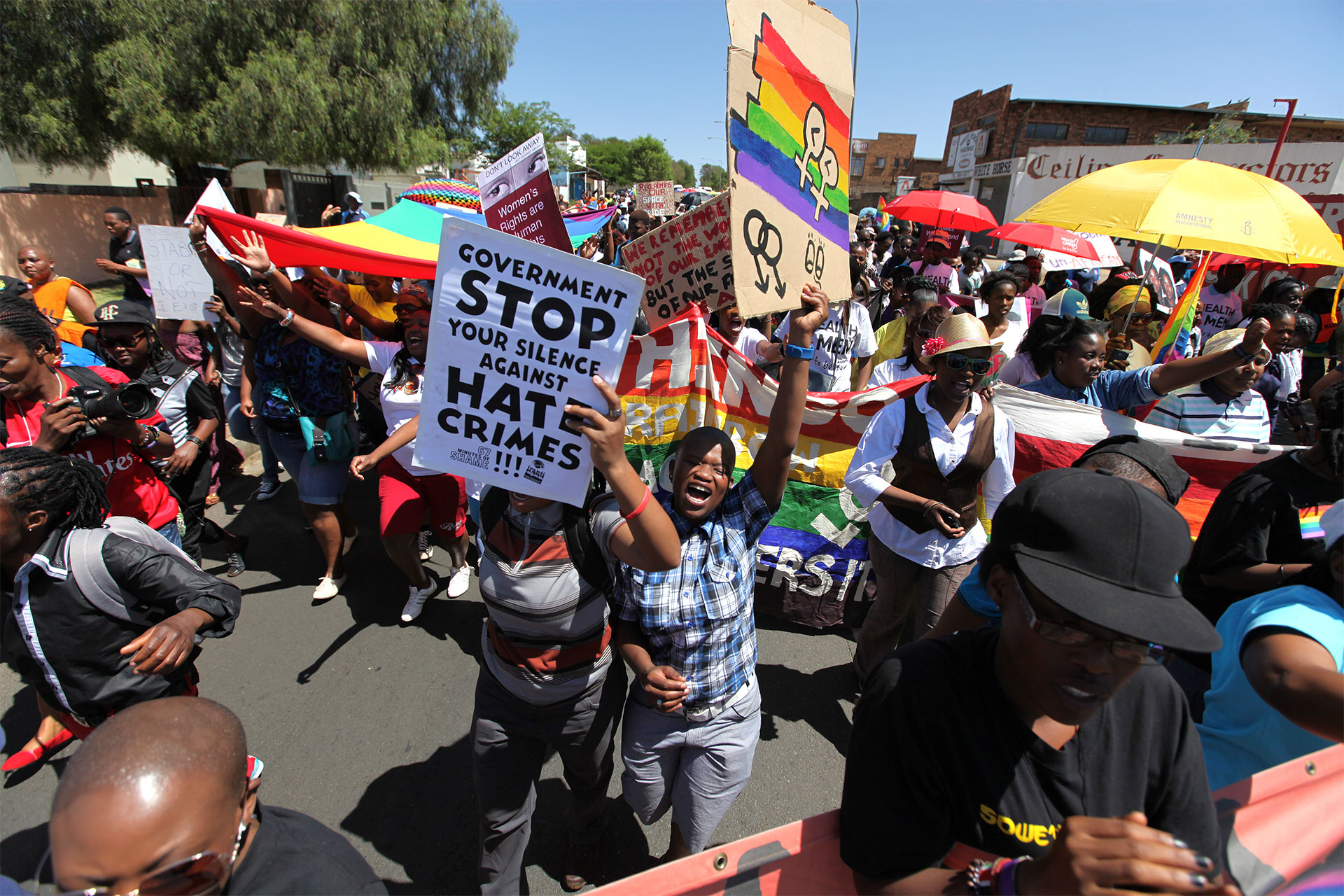YOU SAID NO TO HATE. YOU SAID NO TO FEAR. YOU SAID NO TO A WORLD WITHOUT HUMAN RIGHTS.
Over the past year, leaders have pushed hate, fought against rights, ignored crimes against humanity, and blithely let inequality and suffering spin out of control. This provoked mass protests, showing that while our challenges may never be greater, the will to fight back is just as strong.
Amnesty International’s report, The State of the World’s Human Rights 2017/18, covers 159 countries and delivers the most comprehensive analysis of the state of human rights in the world today.
While the findings remain shocking, it is the events such as those highlighted in the report that galvanised people across the world to stand up in the face of adversity and make their voices heard.

SOUTH AFRICA
People across the world faced a growing intolerance of dissent and a rise in politics of hate and fear, warned Amnesty International as it launched its annual assessment of human rights last week.
The report, The State of the World’s Human Rights, covers 159 countries, including South Africa, and delivers the most comprehensive analysis of the state of human rights in the world today.
“In 2017 to 2018, profound inequalities continued to undermine economic, social and cultural rights in South Africa, resulting in widespread unemployment and protests against inadequate service delivery. We further witnessed excessive force used by the police, and the space for journalists exposing corruption being increasingly restricted, with incidents of intimidation rising worryingly,” said Sheilla Mohamed, Executive Director of Amnesty International South Africa.
Burning injustices fueling protest movements
Profound inequalities continued to undermine economic, social and cultural rights (ESCR) for millions of South Africans.
“With unemployment at 27%, and service delivery challenges continuing, ignoring ESCR can have dire consequences,” said Shenilla Mohamed. Despite a legally binding commitment to build 5 500 new houses, Lonmin Plc, a UK-based platinum mining giant, allowed its workforce to live in squalor in Marikana. This was a contributing factor to the events that led to police using unjustified lethal force against miners, resulting in 34 deaths on 16 August 2012.
The victims and their families are still awaiting justice, and houses, from the government and Lonmin Plc almost 6 years later.
Unless the government tackles the underlying causes of poverty and inequality then there is huge potential of even great unrest, and further incidents such as the Marikana killings in 2012.
Shenilla Mohamed, Executive Director of Amnesty International South Africa.
Excessive use of force by police must end
The Independent Police Investigative Directorate (IPID) reported an increase in the abuse of power by the police, including 394 deaths as a result of police action and 302 deaths in police custody in 2016-2017, both figures higher than in 2015-2016, which were 366 and 216 respectively.
On 17 April, journalist Godknows Nare was shot in the back by police in as he exited his car with his arms raised in Florida, Johannesburg. IPID investigated and handed the case to the Director of Public Prosecutions, Shaun Abrahams. Three police officers were arrested for the killing on 25 January 2018.
On 27 May, Samuel Mabunda, a migrant from Mozambique, died as a result of injuries following beatings by the ‘Red Ants’, a private security firm hired by the police to carry out evictions in Ivory Park, Johannesburg. An IPID investigation into the incident was ongoing at the end of the year.
On 12 September, 14-year-old Ona Dubula was shot in his face and ribs at close range with rubber bullets by police officers at an informal settlement in Hout Bay, Western Cape, during protests over fishing licences. The injuries have left him with speaking difficulties. An IPID investigation into the incident was ongoing at the end of the year.
Freedom of expression must be protected
The right to freedom of expression became a key battleground for human rights globally in 2017, and South Africa is no different.
On 7 July, the South Gauteng High Court granted the South African National Editors’ Forum (SANEF) and 11 journalists an interdict to prevent Black First Land First (BLF), a political party, and Andile Mngxitama, its leader, from intimidating or assaulting journalists and going to their homes. This came after journalists covering allegations of corruption involving Jacob Zuma and the Gupta family reported threats and harassment.
On 17 July, Micah Reddy, a journalist at the amaBhungane Centre for Investigative Journalism, said that he was harassed by a group of BLF supporters and members, following his participation in a panel discussion on allegations of corruption involving President Zuma and the Indian-born Gupta family.
On 27 July, amaBhungane organised a public event in Johannesburg to discuss the alleged corruption by the political elite. The meeting was disrupted by BLF members and a group of about 20 people believed to be from the MK Inkululeko Foundation, a veterans’ association.
On 11 August, the South Gauteng High Court found the BLF, and Andile Mngxitama, were in contempt of the 7 July court order, following an application by journalists Sam Sole and Ferial Haffajee as well as SANEF. The court also ordered the interdict to be extended to all journalists and is still in place.
Amnesty International has documented the human rights situation in 2017/18 in 159 countries.

Background
The organisation has documented varying human rights violations in South Africa in 2017/18, and found that:
- Abuse of police power increased
- Unlawful killings in KwaZulu-Natal province continued
- Gender-related violence, including killings, remained widespread
- Gross inequalities in women’s access to sexual and reproductive health services persisted
- South Africa’s commitment to international justice remained in doubt as the government pursued its decision to leave the
- International Criminal Court (ICC)
- Freedom of expression was undermined with increased intimidation of journalists
- Lesbian, gay, bisexual, transgender and intersex people continued to face harassment, discrimination and violence
- Human rights violations and discrimination against refugees, asylum-seekers and migrants continued

